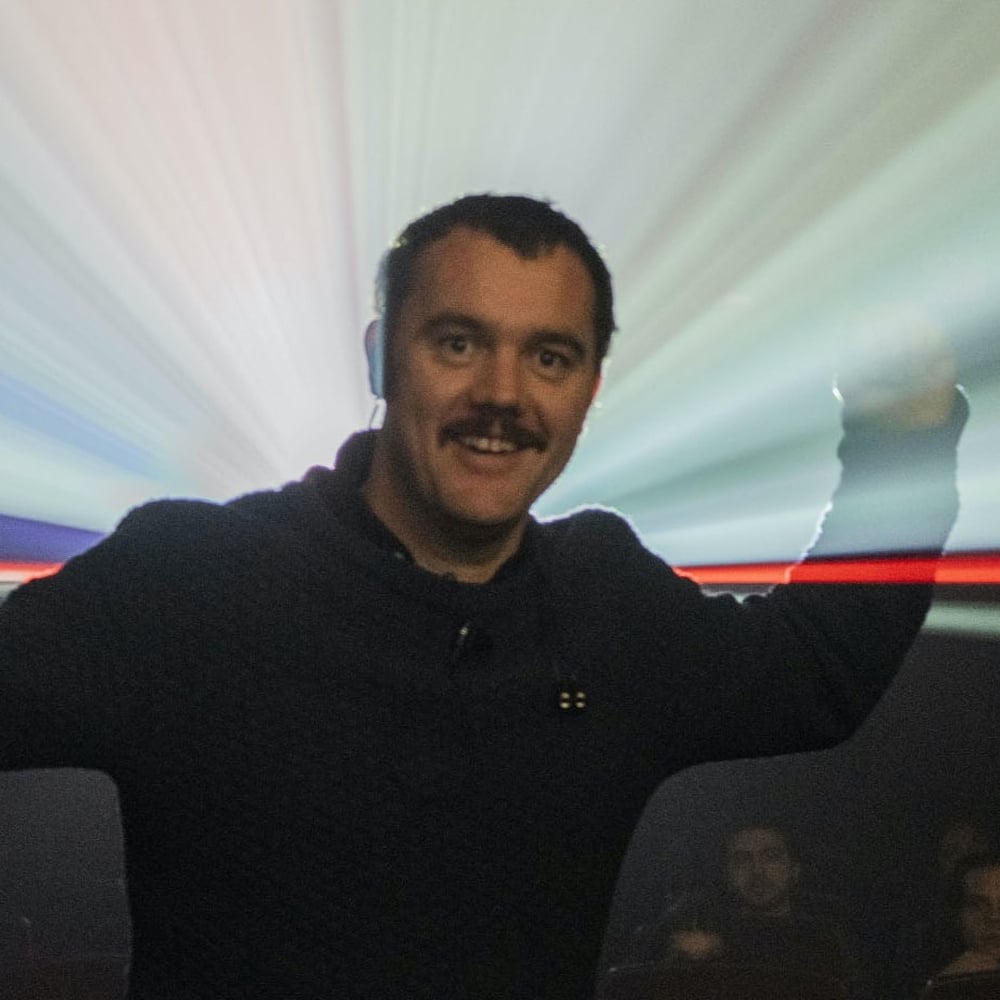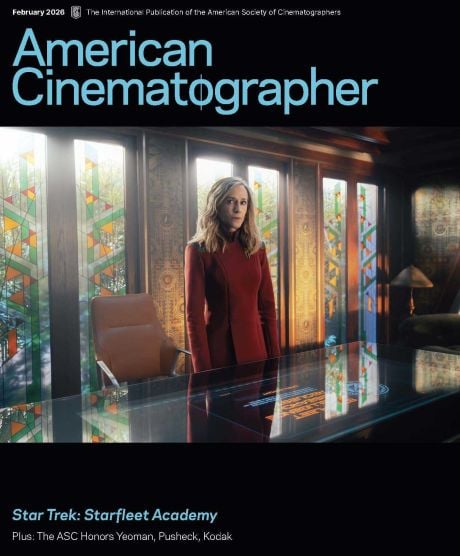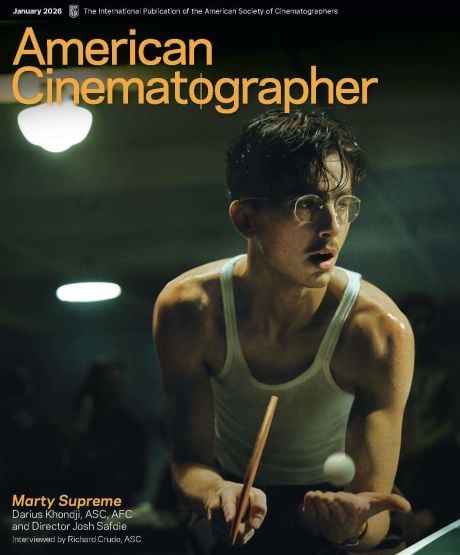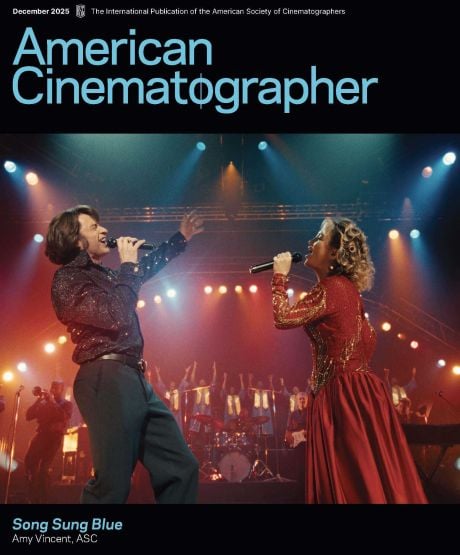SPONSORED BY: ASC MASTER CLASS
In this “ASC Close-Up” episode of The American Cinematographer Podcast, AC contributor Tara Jenkins talks with cinematographer Edu Grau, ASC, AEC — who was invited to join the Society in 2021.
Grau details his experiences at the Cinema and Audiovisual School of Catalonia and the National Film and Television School in London, the chain of events that lead to his breakthrough work in Tom Ford's A Single Man, overcoming self-doubt, and the importance of being a good person both on and off the set.
This episode was recorded at the ASC Clubhouse in Hollywood.
ABOUT THE PARTICIPANT
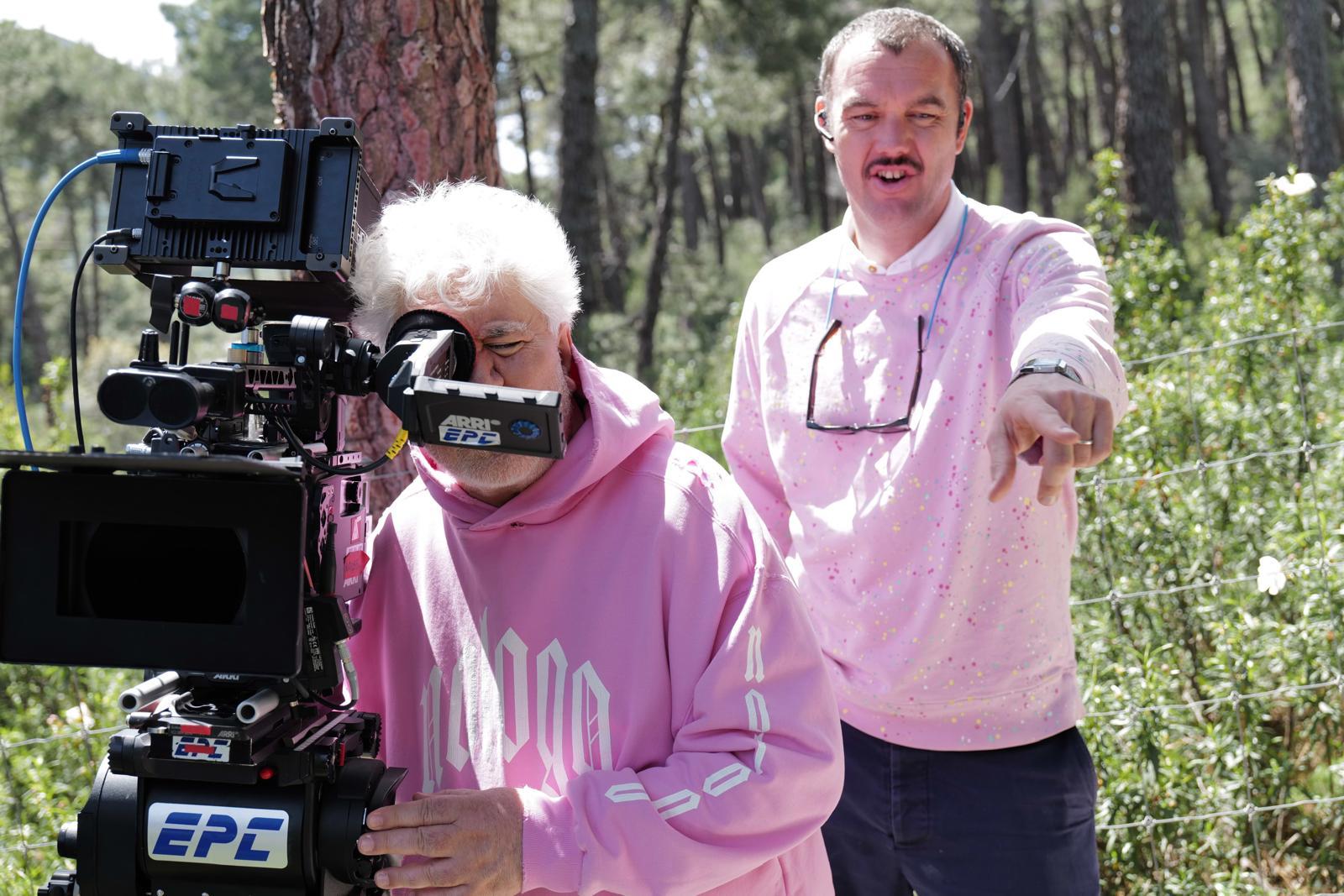
Born in Barcelona in 1981, Eduard Grau specialized in Cinematography at ESCAC in Barcelona and the NFTS in London, before making his first feature as a director of photography at 23, Honor de Cavalleria (Cannes Director's Fortnight, 2006). In 2008, Tom Ford brought him to the U.S. to shoot A Single Man. Since then, Grau has worked with directors Albert Serra, Carlos Vermut, Gavin O'Connor and Pedro Almodóvar. His work in A Single Man, Suffragette, A Single Shot and Animals competed for the Golden Frog at Camerimage. He won the 2010 Bronze Frog for Buried, the 2019 Cinema Writers Circle (CEC) Award for Quién te cantará, and in 2022, Passing won Best Cinematography at the Independent Spirit Awards. His other credits include commercials for Volkswagen, Sony, Mastercard, Gucci, Kodak, and Apple, as well as music videos for Lady Gaga and Lykke Li. His most recent feature is The Room Next Door and the cinematographer participated in his first ASC Master Class as an instructor in October of 2024.
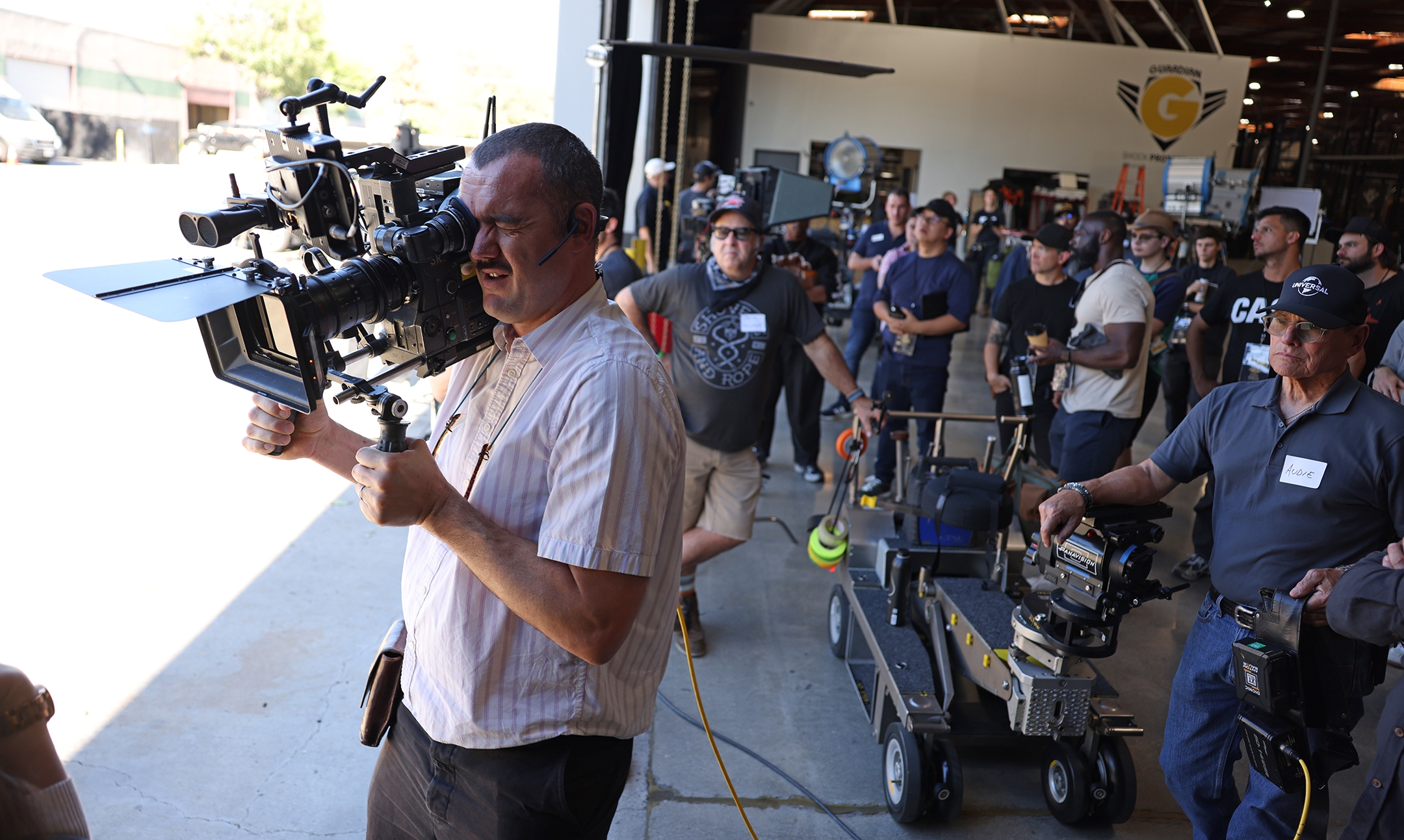
ADDITIONAL LINKS
AC's coverage on the production of Passing
The AC Podcast about the making of Buried
In this ASC Clubhouse Conversation episode, Grau interviews Paul Guilhaume, AFC about Emilia Pérez
Visit the cinematographer's Instagram and personal website
TRANSCRIPT
I'm Tara Jenkins with American Cinematographer, and I'm sitting here live at the ASC Clubhouse with Edu Grau, and I am really excited to talk to you. You're having a great late summer, I would say, just getting back from Venice.
Edu Grau, ASC: Incredible.
So I'm stoked to talk to you about your career.
Yes please.
When you were growing up, what were some of the films that made the strongest impression on you? What really sparked your interest in film?
I think I, you know, it's a combination, but I remember seeing The Bear, an old film in theaters. That was my first movie in a theater ever. So that was pretty impressive. It was a, you know, no dialog movie that was pretty, it stuck with me for a long time, but then I think it was Ken Loach and Abbas Kiarostami, Taste of Cherry, seeing the films that won in Cannes, you know, when I was young. And so that was like, yeah. Growing up, it was like, "oh, I want to do films like this," then somehow life takes you in a different path. But it's just yeah, that's the ones, the films that I really enjoyed growing up.
“In life, your teachers make you a better person and a better artist. And I think I was very, very lucky with the people I found along the way.”
What cinematographers do you admire?
So many. I would say Gordon Willis [ASC] was one of the ones that I was most impressed by at my earliest age. And then Darius Khondji [ASC, AFC]. It was just like an incredible body of work that I always admired. And like, Bradford Young [ASC], Robbie Ryan [BSC, ISC], Marcel Rév [ASC, HCA], my friends and, you know, cinematographers in Spain like Arnau Valls [Colomer, AEC] and Óscar Faura [AEC] have always been like a reference for me, you know, not only in the way they shoot, but also in the way they inhabit the world and they kind of live, you know, so... And then lately, I've been very impressed with Matyas Erdély [ASC, HCA] and, you know, and so many, just like, you know, always the classics, like Robert Eslwit [ASC] has always been, you know, one of my favorites. And same with Natasha Braier [ASC, ADF] is always, you know, someone that I really, really admire. But so many I cannot- My, the list goes on and on.
I think it's wonderful that you named so many of your contemporaries. I think it's wonderful that you can, you know, have friends who also inspire you.
Exactly. I think I learned so much from my friends, that it's impossible not to name them. And I think this profession is not only what they do, but also how they live their lives, how they are on set, who they become as humans as well as artists, you know. So I think that's why, also the contemporary ones also influenced me the most. Because also they're the ones that are closest to me.
What originally sparked your interest in photography?
It's a funny thing, because, like, I was at 12 years old, my best friend at film school, I know at school, he was like, "I want to study film." And it's like, that's what the thing I was like, "oh, that sounds like the most fun I can have," as in a profession, and, and basically, that's, you know, since 12 years old, that was my, you know, that my goal to just, you know, study film. And that's how it went. My friend, my best friend, unfortunately, he went into philosophy, but I got stuck on film, luckily for me as well.
So going from the interest and love of film in general, how did you find yourself wanting to pursue cinematography?
You know what? I entered the film school in Barcelona when I was 18. And very early on, I started going to film shoots, you know, of the of the older all the other students, and I was a PA on one of the shoots, and I very early discovered the one the people that were having the most fun, the people that were having the most input, the most, you know, kind of joy on set were where the people working in camera, you know. So I was like, "oh, I think I want to do camera. I don't want to be stuck in production or directing." Seems a bit they are suffering, you know. And camera guys, for some reason, it was like, yeah, and this is, these are the guys that, you know, they, later on, became my friends, and this is, you know, some of my idols now, you know. So I was very lucky. I was in the right time, in the right place, with the right people, and I learned, you know, that cinematography was just too much fun to miss. I still think it's one of the best jobs in the world, to be honest. I mean, I feel so lucky that somehow life took me there, because it's like, I was not born to be a DP, you know? I was not, it was not like it just grew in me, you know, it just and I learned, and I worked very hard, and that's how it went. But it was, it was not from, you know, it was not like coming from inside me, or somehow. It was like input from the world and just choosing, and I just think it's honestly one of the best jobs in the world. You can travel. You can meet people. Your job changes every day. You do creative stuff. You are creative. And also get paid properly. And also, you know, like you, you do works of art that gets seen by, you know, thousands and millions of people, which is very lucky. The film industry is... has some issues, but it's also pretty incredible in general. So very, very fortunate.
It's great work if you can get it.
Exactly.
“I've been crafting my career around the idea that I want to do the movies I like. It's not important if I'm recognizable in the movies I do, but it's very important that I choose the movies because of what I love.”
Yeah. So you kind of found your path towards becoming a cinematographer when you were in film school in Barcelona. Did you train anywhere else, or was that...
Yeah, so I finished Barcelona film school. I was 22 and I was like, oh, you know, I was very bad, as you know, focus pulling, terrible. No one wanted me to focus pull. I was very, you know, I could, you know, gaff for an electrician, because I was strong and big, I could do it, but I was not that good. So I was like, “I need to keep studying and talking with our friend Carlos Catalán [BSC].” And he was at the National Film and Television School, the NFTS in London, and he really strongly recommended it to me. And, yeah, and I applied, I was very fortunate because they don't take many people, and somehow I got in. And yeah, I spent two more years studying there, learning English, which was also very, very useful later on in my career. So instead of keep working in Spain or start working in Spain, I just took that every day to keep studying, and I had two more years of practicing, of shooting, of meeting people, of growing intellectually and artistically, and you know, and you know, so they my film friends, also grew and made connections. And it was two very well spent years in London, you know...
Who were some of your early teachers or mentors in Spain?
I had Tomàs Pladevall [AEC], who is one of the biggest geniuses of cinematography, especially technical advice. And then I also had Óscar Faura, who was incredible. JA Bayona, the director of the Society of the Snow, was also my teacher, which was kind of incredible looking back at it. You know, he was very young, and he was an incredible teacher. And then in London, Sean Bobbitt [BSC] was an incredible teacher. Stuart Harris [BSC] was also amazing to be part of. And you know, there were so many, so many people that, like you, can learn from. They inspire you. They make you better. They make you grow. They make you think, they make you, you know, just they push your creativity. And, you know. And I think I was very lucky, you know. I mean, but I never thought I could do anything artistic when I was a kid, you know. And I had this plan, you know. And I always had bad, not bad, like very average marks in arts. And somehow there was this teacher that gave me an "excellent" and I was like, wow, how come? For the first time in my life, when I was 14, I got an “excellent” in arts. And he said, "You're very bad at putting anything to paper, but your concept is very good." I thought that that was very beautiful. And somehow that gave me confidence that I could be an arts person, and I could work in arts, although my plastic qualities were deficient, you know. So it's a bit of a combination. And I think, you know, the concept should come first, and it's very important, you know, the concept of things in and I was, I was good at that, so that gave me confidence. So in life, your teachers make you a better person and a better artist. And I think I was very, very lucky with the people I found along the way.
Oftentimes, we just need that person who believes in us.
Exactly.
Yeah, to give us permission to believe in ourselves.
Exactly, exactly. And, you know, and yeah, you just, you know, when you find those people that you connect with that you know that they suddenly find something new that you didn't even know, that's that's incredible.
What are some of your key artistic influences?
So many, it's just like, my dad, the thing he liked the most on the weekends was to go and see art. Plastic painters, you know. And so, I'm not very contemporary at first, you know. So from early, early age I was connected with that. Now I'm married to, you know, an art curator, a contemporary art curator. So art has always been in the back of my head for a long time, you know. And you know, from Turner to Bacon to, you know, Kandinsky, I love, and I love a lot of contemporary art, contemporary artists that they just, you know, break the limits of what art is, and they are playful at their form. So yeah, these have influenced me the most. But also, like some of the photographers, Roy DeCarava is one of them, like, Saul Leiter, it's always been, I've always had all his books because I love his photography. [Terry] Richardson, I like, you know, it's so many that it's like, yeah, sometimes, like, even difficult to, you know, to pin it down. But I get a lot of influences from different places. The same with music, the same with, you know, like journalism, you know, and documentarians. I also, you know, there's so many influences that I think I mix them like we mix them all in our head, and then when it comes out it's sometimes difficult to pinpoint, but it's like it's a mix of it all. You know?
What do you consider your first big break?
You know, when I was 23 and we're doing one film school and the other, you know, there was this crazy art house, European director that was doing his first movie, and he just, like, took me on into his things, ah, you know, we have an operator, but you can also come and, you know, you're both going to be the DPs, you know. And it was all, like, kind of a bit crazy and very wild, and I don't know, it was like, the movie had a budget of 20,000 euros, you know, at that time. So it's like, very, very crazy. And that movie ended up going to Cannes Director's Fortnight, you know. And that was my first movie, and got into Cannes, and I thought, "Wow, seems easier" than you know, and then I've never been able to get into Cannes again. So that was my first big break. But then, probably the biggest break, or the biggest change in my life, was Tom Ford picking me up when I was 27, to do A Single Man, which completely changed my life, you know. And I'm probably living in Los Angeles now because of that break and I'm having the life I have because, you know, Tom Ford, you know, totally gave me the confidence and trusted me to do his, his first ever movie, you know. So...
How did that come together that you know, and ended up interviewing for this with Tom Ford?
It's a very long story, but it was just a lot of coincidence and being at the right time in the right place. Basically, I did a short film at Film School in London with a friend of mine. We went to the Arctic Circle, me and him, to do a documentary. Then this documentary ended up being in the Edinburgh Film Festival, and he couldn't go. And I end up going alone. And I, you know, watch a lot of films and enjoy, had a lot of fun, but watching my sixth film of that day, that was a midnight surprise screening. On the line in the line waiting on line for the movie, I start talking to the person next to me, and she happened to be the producer of a film that was also in the festival, Billy the Kid, by the way, a masterpiece of a documentary, and the girl, Chiemi Karasawa, we became friends from there, and we partied in the festival, and then a year later, I met her in New York, gave her my DVD and I hadn't been working for six months. I hadn't had many jobs for six months, and she took that DVD and somehow ended up sending it to Tom Ford, because a friend of hers was producing Tom Ford's movie, and he they were looking for someone young, bold, European taste, cheap, available and very quick. And I seemed to happen, I seemed to tick, I happened to tick all the boxes. So she sent my DVD, and Tom Ford watched it for two minutes in his office, and said, "I want this guy." And then they called me, and I was in London, and said, "Hey, you have to come to LA," and I said, "Well, I'm in London shooting, well, you know, can I do a Zoom? He's like, "No, no, he likes to meet people in person." So I had to fly to L.A., read the script on the plane, you know, had diarrhea for two days, and then I just happened to, you know, meet Tom Ford. And after 10 minutes of meeting Tom Ford, I got the movie, and I was in the right time, in the right place, you know, and they were, like, five weeks before shooting, so they were having to find someone, and I just he fell in love with my reel and there we go. And he just didn't, just didn't care that I didn't have — I'd only done one little movie, and he didn't care. He just liked my hand held 16mm grainy short films, you know, that were poetic. So that's how he hired me, and then suddenly I was doing a movie with one of my favorite actresses of all time, that is Julianne Moore and with Colin Firth, and...
That's incredible.
It's crazy. It's crazy that you know, a film in the Arctic Circle, a documentary short film in the Arctic Circle, randomly with my friend ended up giving me the chance of, you know, working with Tom Ford in Los Angeles.
Yeah, you never know where your work is going to get you.
You never know. And yeah, that was one of the big lessons, yeah, of life.
What's been one of the most satisfying moments on set for you?
When I was shooting Suffragette, which was a big movie for me. We were shooting on 16 mil, and for the first time in history, they allowed us to shoot in the Parliament of London, you know, the UK Parliament. And it was pretty satisfying to have three camera operators. And the three camera operators were my friends from film school, you know? So like having them and speaking in Catalan on the walk in the Parliament of the UK. It was pretty like, "Oh, wow. You know, I'm working to a high standard in a well-known place, and I'm working with my friends and doing a good job." So it was kind of very beautiful. And you know, I'm sure I had a lot of other incredible moments on set and so on, but I don't know. I keep that one close to my heart.
Yeah. I mean, getting to work with your friends, getting to bring them up with you, I think, is a beautiful thing.
Exactly. So that's something I always wanted to work with my friends, to make movies with my friends, and you know, it didn't happen that much in my life, you know. So it's like I've always tried, and keep pushing to work with the people I love, because I think you know this job, you know, this craft, requires love and care and working hard. And I think I get that a lot from the people that love me and that respect me and that we have a similar upbringing and we have similar interests and similar taste. And working with people like this is always a pleasure.
Have you made any memorable blunders on set?
Oh, so many, so many. Yeah, there's this, this word in Japanese, I'm probably gonna mispronounce it, but it's "wabi," something like that. And it's basically, it's "terrible" and "terrific," you know. And it's both things and I like, also terrible and terrific are so close, you know. And this is word in Japanese, depending on how you say it, it's one thing or it's the other. I think the line, I always navigate, this line between the terrible and the terrific, you know. And I like, you know that you know, something that is just terrible, just with a couple of touches, with a couple of luck, with a couple of, you know, working hard or insisting, it can end up being terrific, you know. So, I mean, I was when shooting Buried, for example, we were pushing it so hard, and we were, you know, on the edge of exposure so much. And sometimes we were shooting, and on the light meter it would say "EV", but I would just trust that I could see enough on camera, that it would be fine. And I think a couple of times we pushed it too hard and, you know, and it was just too dark, and we had to, we had to go again. But it's also that line, that line between, like, two-thirds, you know, one-third, two-thirds, you know, because some of the other scenes that were exactly the same, just the thing came up, and it was just perfect. And I look at them, they are the my favorite scenes in the movie. But those ones, we had a couple of, a couple of shots, a couple of little scenes that we had to reshoot, and having to tell [actor] Ryan Reynolds I screwed up and I was like, that we had to reshoot was pretty hard. But then it was quite beautiful as well, because the director, Rodrigo Cortés, he came to me, he gave me a pat on the shoulder, and said, "You know, this is also my fault. You know, this is because I'm pushing you, I chose you. We're in this together. So let's keep going. Let's not, you know, let's... let's be as bold and keep, you know, let's not be scared of fucking it up again." You know, it's just like, it's we... it's, it's part of the job. You know, we are navigating this line, and you know, this is also what makes our job so exciting. So it was kind of a blunder, but they also came with a lesson for life that is like, we are all responsible. We're in this together. And, you know, that's kind of, you know, what film is, you know, teamworking.
Yeah. And I feel like, if you're trying to push things, you know, sometimes it's not always going to work out, and you have to still be willing to push.
Exactly, exactly. And it's like, yeah, and that was the scenes when they came out, there were, you know, we played them a bit more safe, and they were okay, but obviously they are not as good as the ones that we took the risk as much, you know. It was, so it's like, you know, obviously you always get a bit scared from the mistakes. But it's also good to remember that the gray hairs are the ones that make you grow. You know, like, it's like when you push it, and that has happened a lot in my life and my career, is that like when you push it, when you take the risk, is when you get the most rewarding result. It's like, when you are the most happy with what it comes out, you know? So it's like, so it's a very, it's a very edgy line, you know?
Yeah, what's the best professional advice that you've received?
I don't know. I received so many and so many things to learn, but I do remember very well when I was growing up, I would be at Camerimage trying to sneak into the parties, into the grown-up parties. And the boss of Panavision London, you know, Hugh Whitaker, he will always enter us into the parties. And he, one day, he would say, look, look at all these people. You know, there are a lot of great cinematographers here. They all do their job. They are all but remember that the ones that go to the top, the best ones, are always the good people. It stays with my mind. It's not always true, actually. And looking back at it now, there are some that make it to the top, that are not nice people, but I, but I but there is something for sure. It's like, if you are a nice person, if you get your crew that you know, you will work with the people you like. You work hard. You get good relationships. You're, you know, a good person on set, it does help you to grow and to get to the top, you know. So, it was kind of beautiful advice. You know, just believing that it's not only talent, it's not only artistic, it also comes with people and getting along with people and being a good person that helps you.
And I do think that I feel like most DPS are pretty good people.
Yeah, I think so. I think so, the better person you are, the happier you are on set, and that also translates in what you do and so on. It's not a necessity. It's not easy, also, to keep a good attitude and a good you know, and a good mood on set. We have so much pressure some days that we all have bad days, and we all have bad moments, and it's just difficult, you know. But I think if, if your heart is in the right place, it does help you, you know, because the job is also so much about relationships and so much about people caring for you and working hard for you, and helping you. And it's so much of team playing, team building, you know that is just an important lesson for me.
What recent books, films, or any other kind of artwork have inspired you?
You know what? I now have two kids, and I've been traveling a lot and I haven't been watching films. During the summer is a bad time for me to watch films. I haven't watched that many films lately, but, but it's not right now. You know, starting in the fall is like when I really get super excited about seeing a lot of films and seeing everything that comes out, that's been good. You know, I love [I Saw ] the TV Glow movie that I watched recently, and I love Perfect Days that I just caught up from last year, from Wim Wenders. It was so inspiring to see Franz Lustig's images in Tokyo and I'd just been in Tokyo. I've been traveling a lot, so I haven't been able to, you know, watch a lot of films, but the de Kooning exhibition in Venice was incredible that I watched. I just watched. I was there, and yeah, I think I've been working too much and taking care of my family too much. Recently, I haven't been watching that many films or exhibitions. I think I'll need a couple of months to answer this question properly.
Well, I mean, all of that is so obviously vital and important to your life as well. Everything can't be watching films.
Exactly.
Yeah. Well, do you have any favorite genres, or any genre that you haven't really done that you want to try?
You know what, I've been crafting my career around the idea that I want to do the movies I like. It's not important if I'm recognizable in the movies I do, but it's very important that I choose the movies because of what I love. And I and I love cinema in its entirely, you know. And I love art house movies as much as I love thrillers or action or comedies, you know, or or deep, you know, high brow dramas, you know, European movies. So, I've been fortunate that I've been changing genres and doing all sorts of and all of those genres in my life. And every movie is a different thing, and, you know, a different world. And it's kind of exciting to be able to play with genres. And then, like, you know, I hadn't done a comedy or an action movie, and then suddenly Beverly Hills Cop [4] came in, and it's like, okay, and suddenly I'm just ticking those two boxes in one. And, you know, so it's, like, I would like to, definitely, I would like to do more dramas, and, you know, and interesting, very visual dramas, but I've done a few of those, and I'm very proud. And so I don't know, I mean, like, I don't want, you know, I've done some kind of more genre film, but like, like, kind of horror or thriller things I've done in the past two or three, but I don't want to go to horror, for example, I haven't done horror, and I don't, I don't love horror too much. I get too scared. So I don't think I can do this. I can. Also don't I cannot I cannot put my family into watching it. So it's like, I think I'm gonna, I'm gonna pass on on horror. But, you know, I've done thriller. And, you know The Gift and Awakening were kind of, yeah, kind of have had some scares and had some thriller, you know, little bit of horror in it, but not horror, just a little bit of that kind of feeling.
If you weren't a cinematographer, what would you be doing instead?
Oh, I don't know. I'm so bad at everything in life, even sometimes being a cinematographer, that I don't know what could I be? I fantasized about being an architect for a while when I was a kid. But again, my drawings were so bad, you know, like my I was not delicate with my pen, you know, so. But I liked a lot what architects do with spaces, with light, and I enjoy that part of design, for sure. And the other thing I really like, since I was a kid, is teaching. I do like kids, and I do like there's something about teaching that is about attitude and about energy that I can do. I can do that, you know, but yeah. I mean, poor, poor students. But yeah, I cannot tell you how lucky I was to find cinematography, to be honest.
Well, I mean, you know, you're an ASC member. How did that come about? What ASC cinematographers recommended you for membership?
Oh, you know, Natasha Braier, Rachel Morrison and Denis Lenoir, who — I love them all, you know, and I appreciate them. They just reach out to me and say, "Hey, we want you to be ASC," which was one of the biggest proud moments of my life. So I'm very, very, very grateful, and it's been incredible to join this, this association, and it's just, it's just incredible to be a member of this society. It's just once in a lifetime. And one thing that I never thought I would be possible or would I even reach, when I was growing up in Barcelona, I was thinking, "I'll be lucky if I operate the camera in the local news station, I'll be lucky to have a job," you know, so to be a member of the American Society of Cinematographers, first is, it's just kind of... words cannot describe it, you know. It just means a lot to me and who I was growing up and all those years reading the magazine and looking up to all those DPs that are part of the society, so...
Yeah. How has ASC membership affected your life and career?
You know, I think it's something inside me that it's just like, wow. You know that's it's a moment in your life. It's an achievement, you know, it's a goal on its own, you know. And I think that it's inside me, there is something that makes me very happy when I think, or when I see on the slate just before turning over, that, you know, I'm an ASC member, makes me very happy inside, you know? So that's the biggest thing and the most beautiful one that I can think of.
Well, I'd love to end this on just asking if you have anything, any advice or words of wisdom for up-and-coming DPs.
You know, when I made it to the cinematography class in my film school, I looked around and I could see that more than half of the class was more talented than me, had more visual language, more visual knowledge than I did. And I think that there were two or three in my class that were not prepared to be there, that we were not, that we didn't have what the other ones had. And I what both of us, the three of us, we are now like cinematographers working. And I think what we did very, very consistently was like we kept working. We worked so hard, we kept going to every single shoot we could get our hands on. We read all the articles, we watched as many movies as we could. We cinematography became our lives, you know. And it became like everything we wanted to do in life, you know. And so I think that's an important lesson. You know, cinematography is not a job. It's a lifestyle, you know. And I think you have to be very conscious that being a cinematographer, it will affect every single thing you do in your life. You know, it will affect how you how your family is is built, how you have the people you meet, how your interests are around you know, it's not a job, it's not nine to five, it's just something that affects you every day in your life, and the harder you work, the more you care, the more you put your energy in the right places. Is the thing that helps you the most to grow, even if you are not the skillful, talented guy that you know, comes from being born like this. You know, I think it's, it's more than that. And I think there's too many people that think that it's a talent, and I don't think it is as much as working hard and caring and surrounding yourself with good people, good energy, good souls, you know, and being one of them as well, you know, so...
Be a good person and try really hard.
Exactly. Yeah, and care, you know, put a lot of love and passion into what you want. And I think that works, not only in cinematography, works in every department in life so...
Well, thank you for those words and for everything today, yeah.
Thanks so much. I appreciate it. Thank you.
American Cinematographer interviews cinematographers, directors and other filmmakers to take you behind the scenes on major studio movies, independent films and popular television series.
Subscribe on iTunes